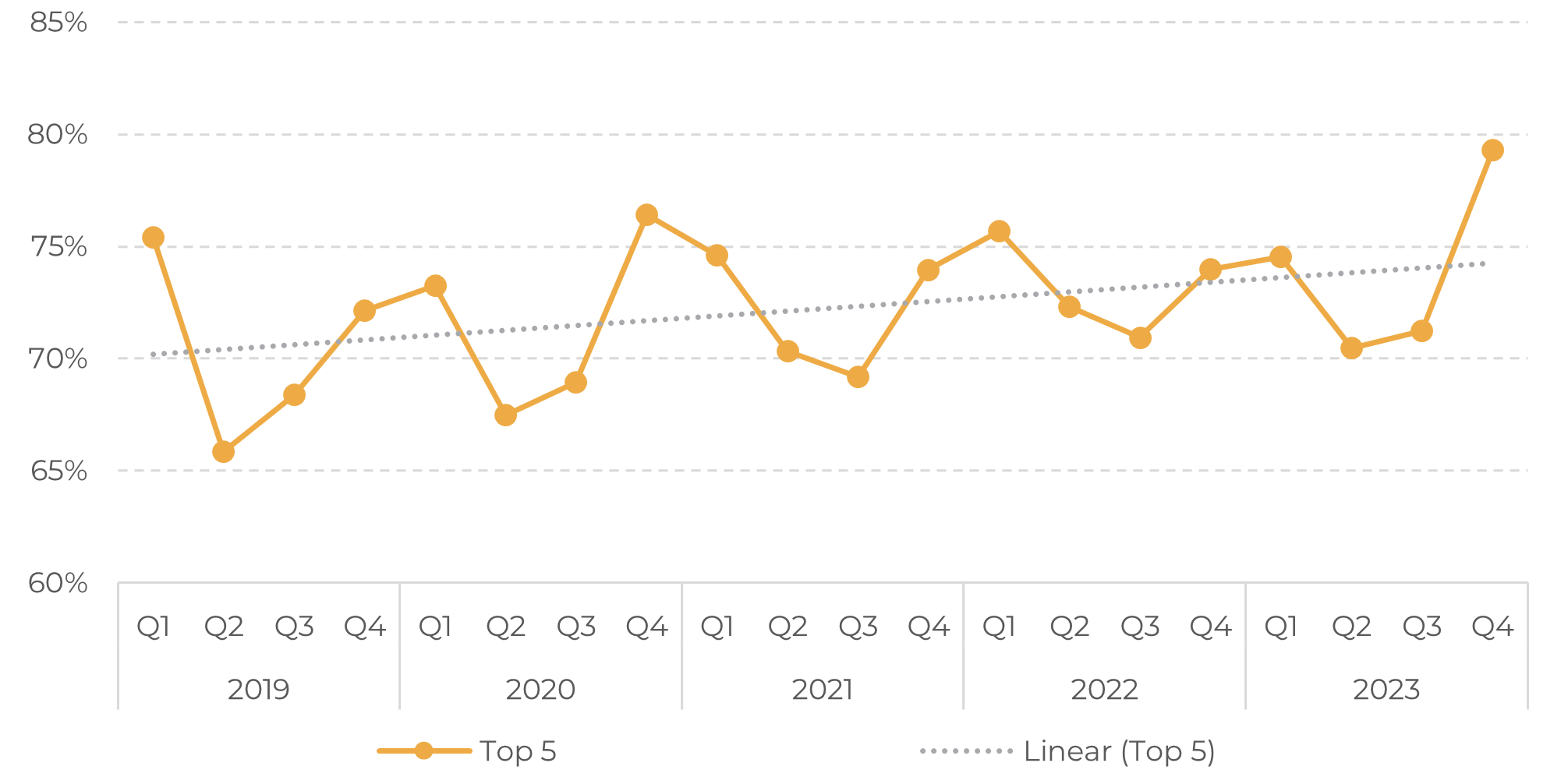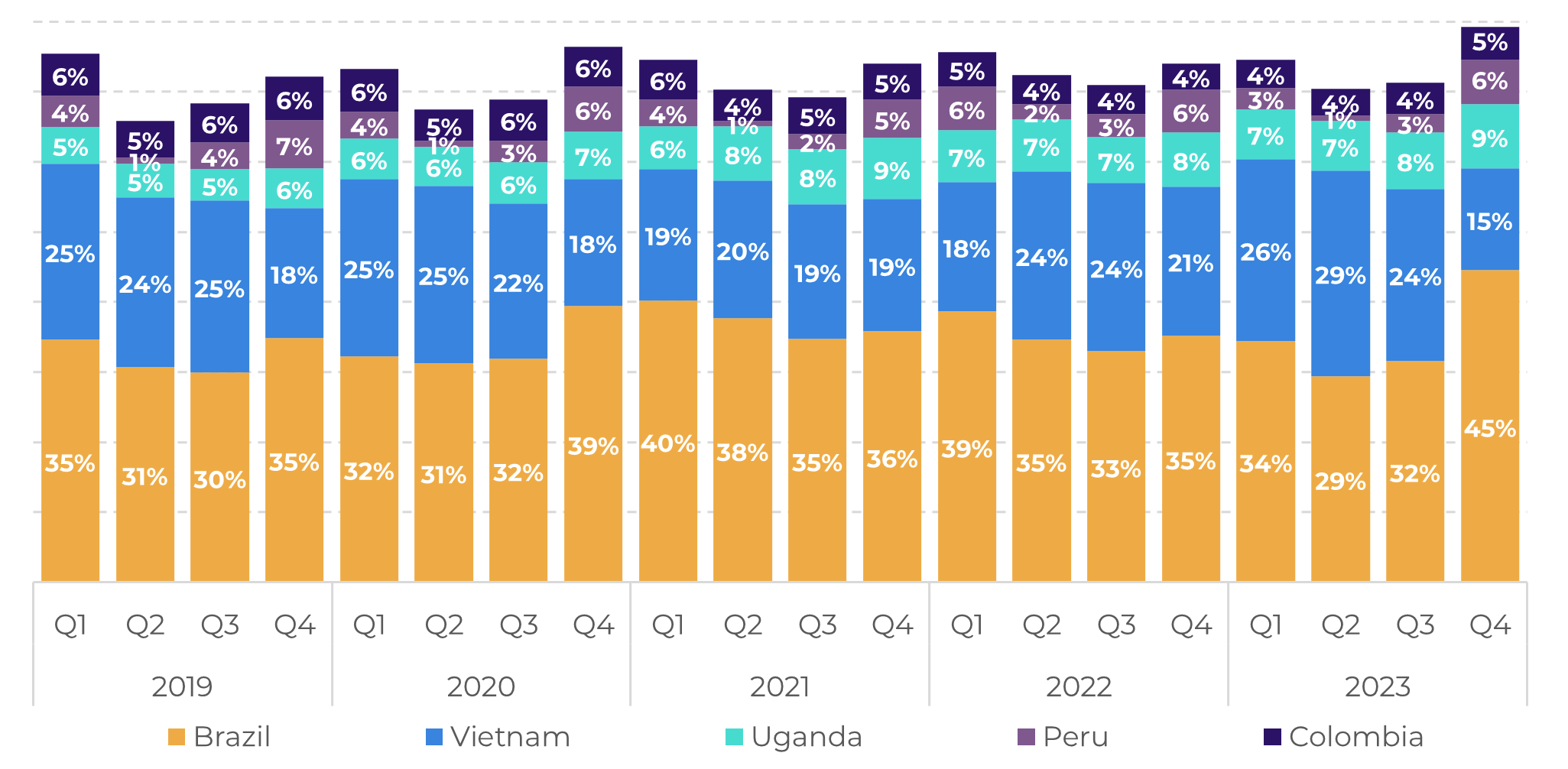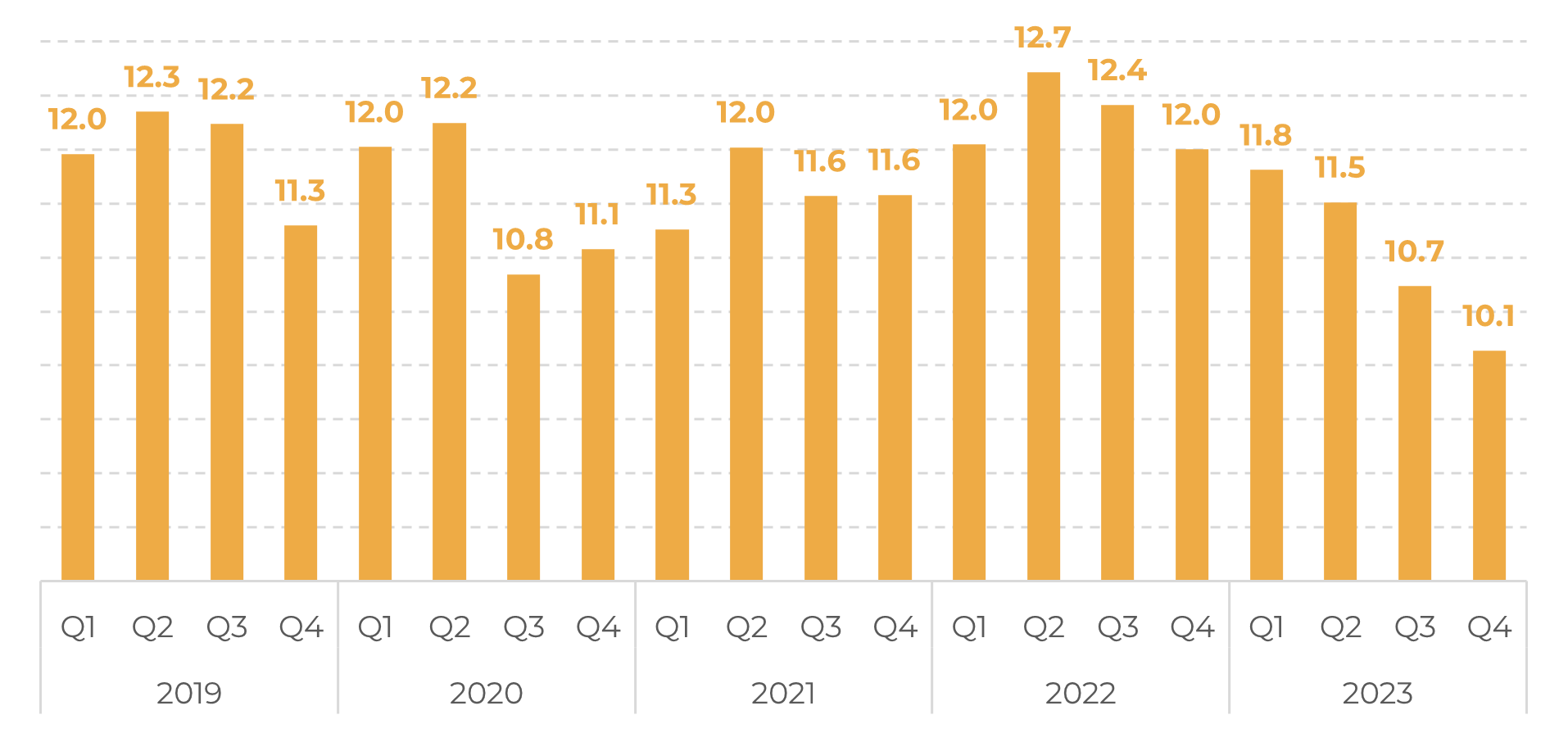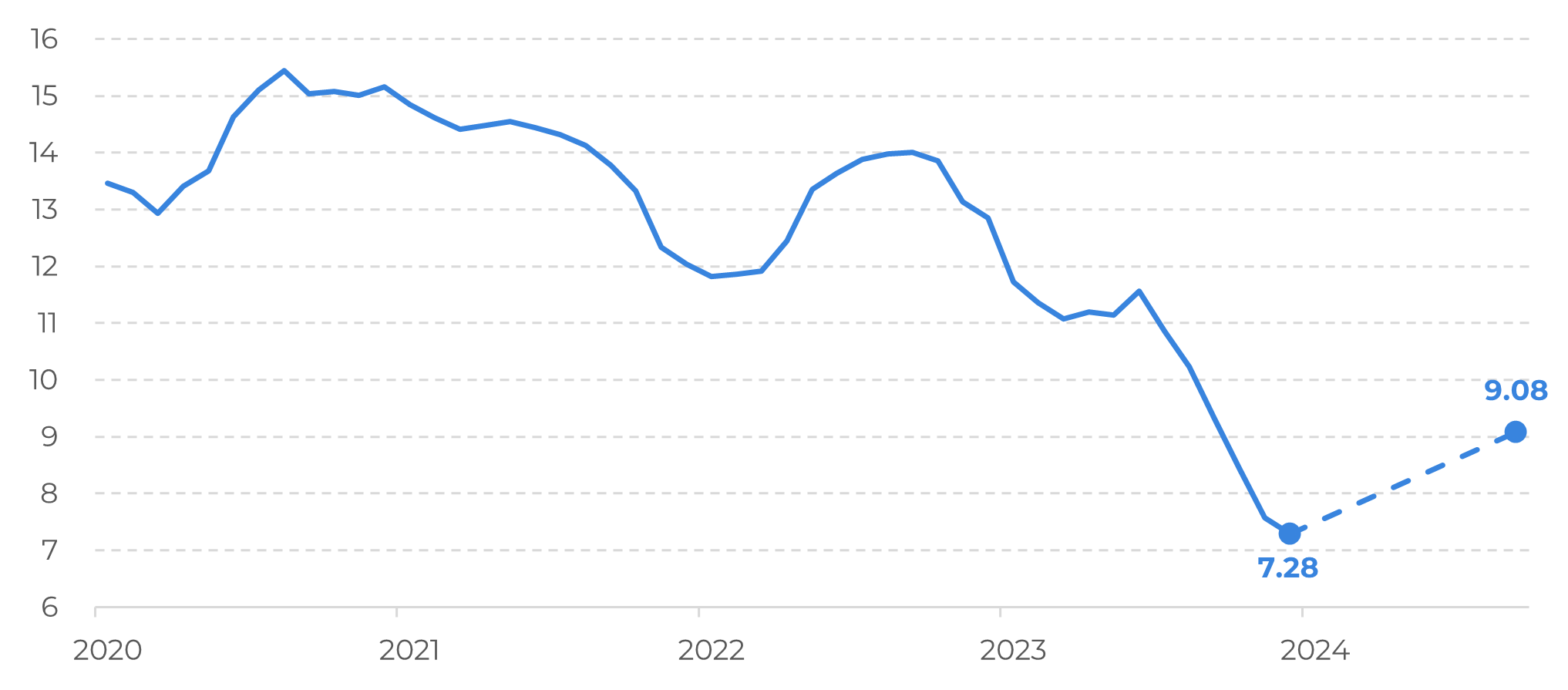
Mar 22
/
Natália Gandolphi
Coffee Weekly Report - 2024 03 22
Back to main blog page
- The report delves into European Union coffee imports, emphasizing a notable concentration among the top 5 exporting nations, now constituting 79% of imports.
- Contrary to seasonal norms, this concentration is steadily rising, reflecting post-pandemic trade dynamics.
- Notably, Brazil holds a dominant 45% share, with Uganda emerging as a robusta alternative and Vietnam facing supply challenges.
- Decreased EU imports since 2022, driven by heightened storage costs and deforestation legislation, have spurred greater reliance on local sources, bolstering prices despite reduced imports and heightened concentration.
- Projected ending stocks for the 23/24 cycle stand at 9.08M bags, a 25% increase, with historical parallels hinting at potential recovery in the 24/25 cycle, barring significant disruptions to crop development.
Trade flow expectations from the EU lens
In this report, we will dive into the profile of European Union imports, in order to better understand the trade flow structure changes that have happened over the last few quarters – and what to expect for the upcoming ones.
First and foremost: market concentration. The share of imported coffee from the top 5 exporting countries (Brazil, Vietnam, Uganda, Peru, and Colombia – as of Q4/23) has increased to 79%, according to the last quarterly consolidated data by Eurostat (Figure 1). The chart shows that, while seasonality does kick in throughout the year, that movement has been slowly fading on the lows. This means that with every year that passes since the pandemic, the expected decrease in concentration between Q2 and Q3 has actually held higher levels, hence the upward-sloping trendline.
Reliance on these top 5 exporters has increased over the past 5 years, culminating in a short-term high in Q4/23. It’s also important to note the role that each country has had individually: Figure 2 shows three remarkable points: i) Brazil, while always being the lead, has taken a 45% share in the last quarter, the highest in the series (due to a heavier reliance on Brazilian conilons too). ii) Uganda has been solidifying itself as a robusta alternative. iii) Vietnam exported its lowest share in 4Q/23, reflecting supply concerns.
Figure 1: Share in European Union Imports – Top 5 Exporting Countries

Source: Eurostat
Figure 2: Share in European Union Imports – Top 5 Exporting Countries, by Country

Source: Eurostat
Overall, the bloc has seen a steady decrease in imports since 2022 (Figure 3) – a direct reflection of higher storage costs, as seen in previous reports. The more substantial drop between Q2/23 and Q3/23 was also linked to new legislation surrounding deforestation in countries of origin.
Consequently, destination countries have depended more on these local supplies, which has led to a withdrawal of stocks, leaving this fact as one of the main points of support for prices, especially with the new trade flow structure – lower imports, greater concentration.
Currently, using USDA figures as a marker for what the market currently expects, ending stocks for the 23/24 cycle are being estimated at 9.08 million bags in the European Union. This would require a 25% increase in stocks – which is, in fact, higher than the average expected for the period (+6%, considering data from the last 10 years). Still, it's important to note that stocks in the EU increased by 38% between December 2013 and September 2014, and there are similarities: origin stocks were 7% higher in the 13/14 cycle compared to 13/12, and helped to sustain trade flow during a global deficit point (as origins were heavily affected by El Niño). Therefore, the recovery to the 24/25 cycle may be a mirror of its historical counterpart.
Figure 3: European Union – Quarterly Imports (M bags)

Source: Eurostat
Figure 4: European Union Stocks and USDA Estimate (M bags)

Source: ECF, USDA
In Summary
The report analyzes European Union imports, highlighting a growing concentration among the top 5 exporting countries for coffee, which now account for 79% of imports. This trend has been steadily increasing, contrary to seasonal expectations, indicating a shift in trade flow dynamics post-pandemic. Notably, Brazil dominates with a 45% share, while Uganda emerges as a robusta alternative and Vietnam faces supply concerns.
Importantly, EU imports have decreased since 2022 due to higher storage costs, leading to increased reliance on local supplies.
This has supported prices despite lower imports and higher concentration. Looking ahead, ending stocks for the 23/24 cycle are estimated at 9.08M bags, a 25% increase, with parallels drawn to historical trends suggesting a potential recovery in the 24/25 cycle, all else equal in terms of 24/25 crop development.
This has supported prices despite lower imports and higher concentration. Looking ahead, ending stocks for the 23/24 cycle are estimated at 9.08M bags, a 25% increase, with parallels drawn to historical trends suggesting a potential recovery in the 24/25 cycle, all else equal in terms of 24/25 crop development.
Weekly Report — Coffee
Written by Natália Gandolphi
natalia.gandolphi@hedgepointglobal.com
natalia.gandolphi@hedgepointglobal.com
Reviewed by Lívea Coda
livea.coda@hedgepointglobal.com
www.hedgepointglobal.com
Disclaimer
This document has been prepared by hEDGEpoint Global Markets LLC and its affiliates ("HPGM") exclusively for informational and instructional purposes, without the purpose of creating obligations or commitments with third parties, and is not intended to promote an offer, or solicitation of an offer, to sell or buy any securities or investment products. HPGM and its associates expressly disclaim any use of the information contained herein that may result in direct or indirect damage of any kind. If you have any questions that are not resolved in the first instance of contact with the client (client.services@hedgepointglobal.com), please contact our internal ombudsman channel (ouvidoria@hedgepointglobal.com) or 0800-878-8408 (for clients in Brazil only).
Contact us
hedgepointhub.support@hedgepointglobal.com
ouvidoria@hedgepointglobal.com
Funchal Street, 418, 18º floor - Vila Olímpia São Paulo, SP, Brasil
Check our general terms and important notices.
This page has been prepared by Hedgepoint Schweiz AG and its affiliates (“Hedgepoint”) solely for informational and instructional purposes, without the purpose of instituting obligations or commitments to third parties, nor is it intended to promote an offer, or solicitation of an offer of sale or purchase relating to any securities, commodities interests or investment products. Hedgepoint and its associates expressly disclaim any use of the information contained herein that directly or indirectly result in damages or damages of any kind. Information is obtained from sources which we believe to be reliable, but we do not warrant or guarantee the timeliness or accuracy of this information. The trading of commodities interests such as futures, options, and swaps involves substantial risk of loss and may not be suitable for all investors. You should carefully consider wither such trading is suitable for you in light of your financial condition. Past performance is not necessarily indicative of future results. Customers should rely on their own independent judgement and/or advisors before entering in any transaction.Hedgepoint does not provide legal, tax or accounting advice and you are responsible for seeking any such advice separately.Hedgepoint Schweiz AG is organized, incorporated, and existing under the laws of Switzerland, is filiated to ARIF, the Association Romande des Intermédiaires Financiers, which is a FINMA-authorized Self-Regulatory Organization. Hedgepoint Commodities LLC is organized, incorporated, and existing under the laws of the USA, and is authorized and regulated by the Commodity Futures Trading Commission (CFTC) and a member of the National Futures Association (NFA) to act as an Introducing Broker and Commodity Trading Advisor. HedgePoint Global Markets Limited is Regulated by the Dubai Financial Services Authority. The content is directed at Professional Clients and not Retail Clients. Hedgepoint Global Markets PTE. Ltd is organized, incorporated, and existing under the laws of Singapore, exempted from obtaining a financial services license as per the Second Schedule of the Securities and Futures (Licensing and Conduct of Business) Act, by the Monetary Authority of Singapore (MAS). Hedgepoint Global Markets DTVM Ltda. is authorized and regulated in Brazil by the Central Bank of Brazil (BCB) and the Brazilian Securities Commission (CVM). Hedgepoint Serviços Ltda. is organized, incorporated, and existing under the laws of Brazil. Hedgepoint Global Markets S.A. is organized, incorporated, and existing under the laws of Uruguay. In case of questions not resolved by the first instance of customer contact (client.services@Hedgepointglobal.com), please contact internal ombudsman channel (ombudsman@hedgepointglobal.com – global or ouvidoria@hedgepointglobal.com – Brazil only) or call 0800-8788408 (Brazil only).Integrity, ethics, and transparency are values that guide our culture. To further strengthen our practices, Hedgepoint has a whistleblower channel for employees and third-parties by e-mail ethicline@hedgepointglobal.com or forms Ethic Line – Hedgepoint Global Markets.Security note: All contacts with customers and partners are conducted exclusively through our domain @hedgepointglobal.com. Do not accept any information, bills, statements or requests from different domains and pay special attention to any variations in letters or spelling, as they may indicate a fraudulent situation.“HedgePoint” and the “HedgePoint” logo are marks for the exclusive use of HedgePoint and/or its affiliates. Use or reproduction is prohibited, unless expressly authorized by HedgePoint. Furthermore, the use of any other marks in this document has been authorized for identification purposes only. It does not, therefore, imply any rights of HedgePoint in these marks or imply endorsement, association or seal by the owners of these marks with HedgePoint or its affiliates.
We have updated our Terms & Conditions to reflect improvements to our platform, data handling practices, and the overall experience we provide to our clients.
To continue using the Hedgepoint HUB, please review and accept the updated terms.

